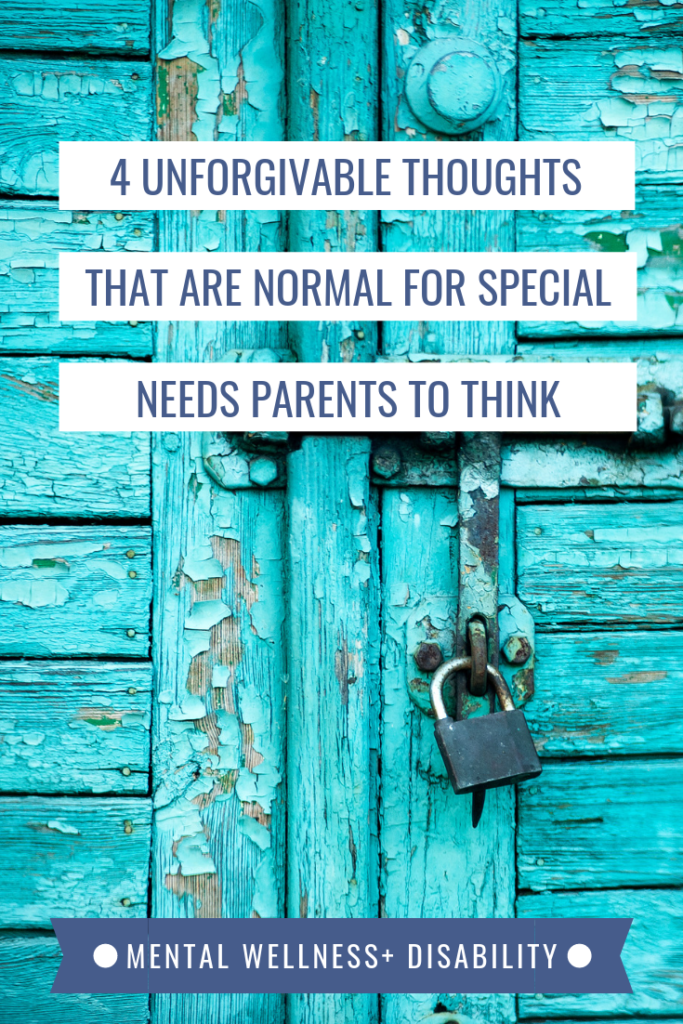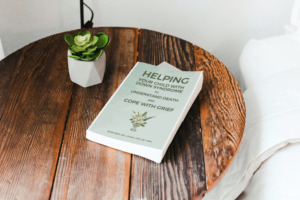I know from counseling parents raising kids with disabilities that there are four unforgivable thoughts that are completely normal for special needs parents to think. Having them doesn’t mean you’re a bad person or a terrible parent. It just means that you’re a human being.

How could a thought be so terrible?
“It’s such a horrific thought…you’re going to think I’m a disgusting person…I’ve never said it out loud, but it’s true.”
I hear this so often from special needs parents.
Parents who feel isolated, who believe that no one could possibly understand what they’re going through.
Who in spite of this, are brave enough to tell me in counseling sessions these thoughts they have that they believe are twisted, wrong, or evil.
Parents who just need to know that someone understands.
The tragedy is that most special needs parents at one time or another have had these same thoughts. Taboo thoughts. Thoughts that feel dangerous to share, because they bring up a lot of ‘what if’s?’. What if…
- Someone misunderstands and they take away my child?
- People think I don’t love my child?
- My child finds out I feel this way?
These and other very real fears keep parents silent.
So, today, I want to give you assurance that you’re by no means the only parent who feels that way, as well as some ideas for what to do when you have one of these four unforgivable thoughts.
I’ve thought of hurting my child
This I hear from new parents whose kids have Down syndrome or physical needs.
In addition to adjusting to parenthood, they also have to get used to what being a special needs parent is. Not only the feeding and sleep schedules and diaper blowouts that all new parents struggle with, but also surgeries and therapy appointments and wondering whether it’s even worth it to set up a college fund.
Or I hear it from parents of two-year old’s who’ve just been diagnosed with Autism.
They’d hoped it was a phase, or that their child ‘just learned differently’. The tantrums, the anxiety, the pressure to always be ‘on’…it’s dawning on these parents that these things are never going to fully go away.
They call while their child is at school and go from asking a question to realizing what they really need in the span of a sentence “can you help my child…my family really…maybe it’s me who needs the most help.”
I ask these parents if they’ve had thoughts of hurting their child.
Since we’re being completely honest here, I used to be stunned by how many of these parents answered truthfully:
Yes, sure I’ve thought of it.
Now, after years of helping special needs families, I get it.
My asking gave them permission to say out loud something they’d buried deep, something they felt no one could possibly understand.
My asking made it possible that they weren’t the only ones who’d ever felt that way.
Later in this post I’m going to share advice for how to deal with this and other difficult thoughts. But if you are having vivid, unshakable, recurrent thoughts of hurting your child, it is time to get the help you need to keep your family safe. If you have a therapist, call them. If you don’t, call a crisis number or go to your local hospital. Get the help you need to overcome this thought immediately. There is never shame in caring for your child, or yourself.
I hope my child dies before I do
This one I hear from parents of older kids. Parents who have come to genuinely love their quirky kids for the people they are.
Parents who realize that the hardest part of raising a child with special needs is not raising a child with special needs. The hardest part is raising that child in a word where they’re unappreciated and misunderstood.
These are parents who are grappling with guilt. They are exhausted, and they know that they can’t go on planning every social activity, advocating for every service, and being their child’s ‘everything’.
But the thought of handing over the reins to someone else, someone who won’t understand every tic or outburst, someone who might care but won’t love, is absolutely terrifying.
We didn’t want another kid, but we had one so that there will be someone to take care of our special needs child after we die
Some parents simply can’t imagine an ‘outsider’ raising and supporting their child. So, they create what they believe will be the next best stand-in when they can no longer be the primary caregiver; a sibling who can take over.
These parents place a high value on family and resourcefulness.
It is usually only when their special needs child is a moderately independently functioning adult that they start to have misgivings about having had another child. A child whose only reason for being born was to grow up to be their ‘brother’s keeper’.
When I meet with them for counseling, they usually express guilt that they led their ‘other’ child into major life decisions with the best interest of their special needs child at heart. Go to college locally. Find a job that doesn’t require you to travel or move, ideally one that gives you an edge in caring for your sibling, such as estate law or finance. Have your own kids young, while we’re still alive.
And so on.
This would be easier if it was just me raising my child
I hear this from parents, usually mothers, of kids of all ages and diagnoses.
These women don’t come to parenting workshops or support groups. When they hear about other women’s husbands, they are reminded of how they view their partners.
They see their husbands as unaware. Apathetic. Incompetent.
They wonder how they can share the same home and raise the same children with someone who is so content to take things as they come, who doesn’t share their worries about the future.
What to do if you’re having one of these thoughts
If you have had one or more of these thoughts, I urge you to first find comfort in the fact you are by no means the only parent of a child with special needs who has felt this way.
Odds are that you and I have never spoken. Yet here I am, just a counselor who helps people who have a kid like yours, writing about a deep dark thought that you haven’t shared with anyone. That’s not a coincidence.
So, what can you do when you have a thought that makes you feel like a terrible person?
Here are a few suggestions:
Find a special needs parent support group
This does not include resource sharing groups, where the focus is on helping your child’s needs get met. This does not include Facebook or other online support groups. Those groups have value, but when you have a thought that you believe is truly unforgivable, you need something different. You need to sit with real people who are hurting and feeling insecure. You need to…
- let them see you struggle too
- acknowledge out loud that this is hard, that this isn’t what you signed up for, and that you don’t know what to do.
- find accountability and hope. If it feels that the group members are only interested in one-upping each other, or in spreading negatively without offering hope…move on. That isn’t the group for you.
Trust in a mentor
Link up with a parent who raised a child with the same disability as yours. Listen as they talk about how they got through the rough times, and be real with them about your fears. Get to know their child, and let this relationship give you hope for the future your child can have.
Read books written by parents of kids with your child’s disability
Not feel good, comedic reminders that everything will be OK. One of my favorite books to recommend to parents of kids with Down syndrome is Beautiful Eyes. This book was written by a physician struggling to accept that his daughter has Down syndrome. This book is a powerful investigation into what it is to have a child with a disability, and what it means to parent them well.
Work with a counselor
A really good one, one who understands your child’s disability and who understands how it’s possible that you can love your child and at the same time have these ‘horrible thoughts’. You need someone who will call your bluff when you’re trying to smooth things over and act as if everything’s OK. Someone who will push to get radically genuine with yourself, and speak truths that even you didn’t know were on your heart. If you’ve tried counseling in the past and it didn’t work, consider if maybe it just wasn’t the right counselor or the right time for you, and try again.
Commit to truly caring for yourself
It’s probably time to get real with yourself about what true self-care actually looks and feels like.Maybe this means reevaluating where you’re spending your time. Or maybe you need devote some time to reconnecting with your spouse.
I genuinely believe that these uncomfortable thoughts are quite common for special needs parents to have.
If you have other ideas for how parents can deal with these difficult thoughts, please share them in the comments.












